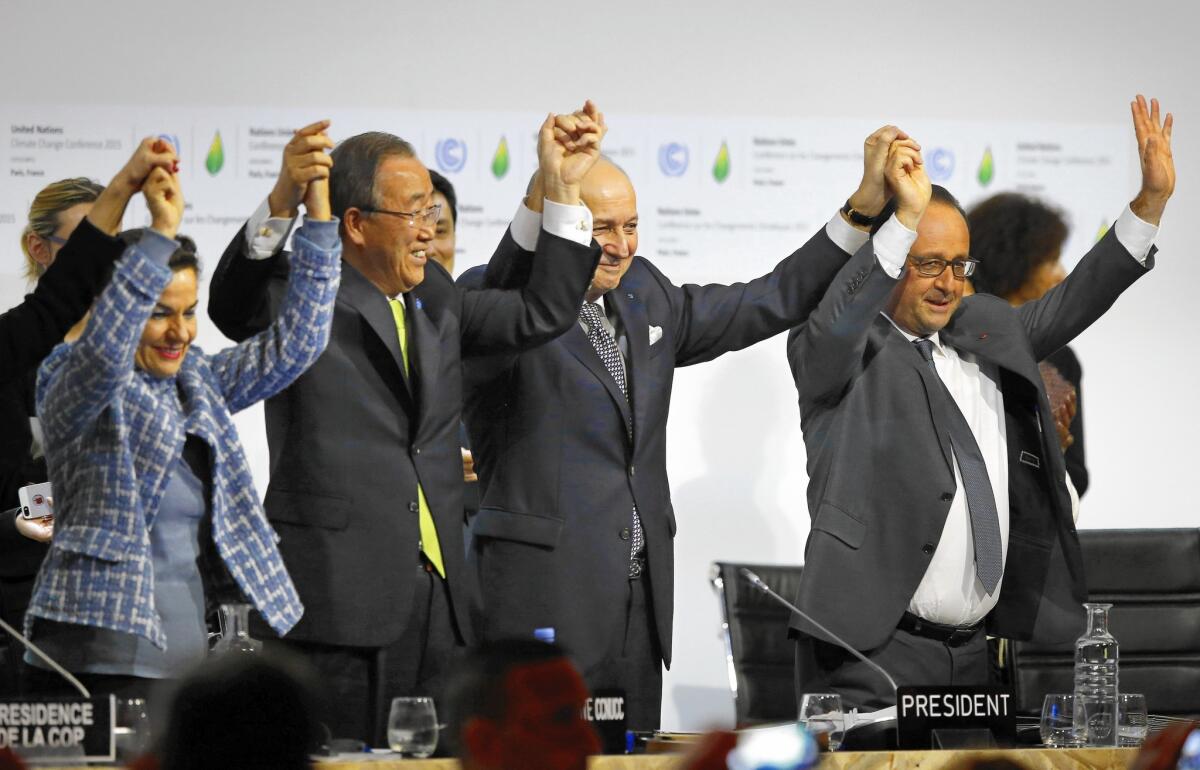Republican presidential candidates go their own way on climate change despite Paris agreement

Officials including U.N. Secretary-General Ban Ki-moon, second from left, and French President Francois Hollande, right, celebrate Dec. 12 at the end of the climate conference outside Paris.
- Share via
A tale of environmental suspense unfolded throughout 2015: Would nations finally reach a global agreement to fight climate change?
Record drought and heat, wildfires, Pope Francis’ encyclical on the environment, President Obama’s Clean Power Plan and his photogenic trip to Arctic Alaska — all became plot points in the developing narrative.
Then, on cue in the second week of December, came the climactic moment: The agreement was a done deal, signed at a conference center outside Paris. Almost 200 nations pledged to reduce the greenhouse gas emissions that cause climate change.
Join the conversation on Facebook >>
It was far from perfect, but there was a widespread sense that history had been made. The world had vowed to act on a daunting issue.
Yet just as momentum for the agreement was building, an alternative narrative was unfolding in the race for the Republican presidential nomination and raising questions for the year ahead: Will whoever becomes the Republican nominee view climate change as a priority?
Months of Republican debates, interviews, voter polls and Twitter posts suggest that, at least during primary season, the answer is no.
Few differences between Republican and Democratic candidates (or, for that matter, between Republican candidates and most world leaders) are as stark as their opposing positions on climate change.
The day the Paris agreement was announced, Democratic primary rivals Hillary Clinton and Bernie Sanders quickly weighed in, with former Secretary of State Clinton calling it “historic” and Sen. Sanders of Vermont saying it was insufficient but at least “a step forward.” Both promised to take bold action if elected.
Meanwhile, most Republicans were silent, following a pattern of either avoiding the subject, dismissing it or rejecting solutions as regulatory overreach that will cost jobs and hurt the economy.
“The scientific evidence doesn’t support global warming,” Sen. Ted Cruz of Texas told NPR a few days before the agreement was signed.
Climate change is the perfect pseudoscientific theory for a big-government politician who wants more power.
— Sen. Ted Cruz of Texas
“Climate change,” he added, “is the perfect pseudoscientific theory for a big-government politician who wants more power.”
Outsider candidates Ben Carson and Donald Trump also question climate science. Trump has said climate change was invented by the Chinese to hurt the United States economy.
“Unless somebody can prove something to me, I believe there’s weather,” the real estate mogul has said. “I believe there’s change, and I believe it goes up and down, and it goes up again. And it changes depending on years and centuries, but I am not a believer, and we have much bigger problems.”
Sen. Marco Rubio of Florida and New Jersey Gov. Chris Christie have acknowledged that the climate is changing but say government cannot fix the problem. Both have said the Obama administration is futilely trying to address the issue in isolation from the rest of the world.
See the most-read stories this hour >>
“America is a lot of things — the greatest country in the world, absolutely,” Rubio said at a Republican debate in September on CNN. “But America is not a planet.”
In the same exchange, Christie said, “We shouldn’t be destroying our economy in order to chase some wild, left-wing idea that somehow us by ourselves is going to fix the climate. We can contribute to that and be economically sound.”
Former Florida Gov. Jeb Bush and Ohio Gov. John Kasich have both acknowledged that humans contribute to climate change but said it is not a top priority. Bush said he was not sure he would have attended the Paris conference as Obama did. Kasich said leaders should have been discussing Islamic State instead.
The Republicans say they will repeal Obama’s Clean Power Plan, which reduces emissions from power plants. Trump has suggested shutting down the Environmental Protection Agency, which created the plan. (“What they do is a disgrace,” he said in October. “Every week they come out with new regulations.”)
The Paris agreement set out goals that are not binding under international law. As such, they do not require approval by the Republican-controlled Senate, which has soundly opposed the Obama administration’s climate goals.
Before Paris, Republicans said the plan puts the United States at an economic disadvantage because other countries are under no obligation to take similar actions. Yet the plan, which helped give credibility to the Obama administration at the negotiating table in Paris, is widely viewed as helping convince other countries to commit to their own reductions.
Whoever wins the Republican nomination will not be able to avoid more serious questions about climate change. Clinton, Sanders and fellow Democratic hopeful Gov. Martin O’Malley of Maryland have all promised to make it central to their administrations — and in the debates to come.
“In the United States we have a Republican Party which is much more interested in contributions from the fossil fuel industry than they care about the future of the planet,” Sanders said the day of the agreement. “That is true all over the globe. We’ve got to stand up to the fossil fuel industry and fight for national and international legislation that transforms our energy system away from fossil fuel as quickly as possible.”
Clinton was similarly emphatic.
“We cannot afford to be slowed by the climate skeptics or deterred by the defeatists who doubt America’s ability to meet this challenge,” she said. “That’s why as president, I will make combating climate change a top priority from Day One, and secure America’s future as the clean-energy superpower of the 21st century.”
Whether embraced or opposed, efforts to combat climate change will remain in the news in 2016. A follow-up conference to the Paris gathering is already planned for Morocco next November.
Twitter:@yardleyLAT
MORE POLITICAL COVERAGE
As Rubio and Cruz vie for Mormon support in Nevada, divide over taxes looms
A year after Congress voted to end war on medical pot, raids continue in California
Obama expands government anti-poverty efforts, frustrating Republicans
More to Read
Get the L.A. Times Politics newsletter
Deeply reported insights into legislation, politics and policy from Sacramento, Washington and beyond. In your inbox three times per week.
You may occasionally receive promotional content from the Los Angeles Times.











